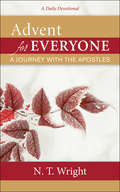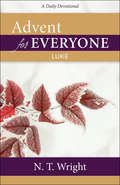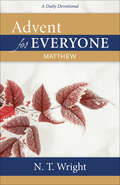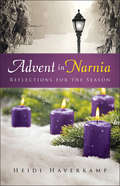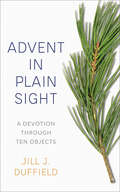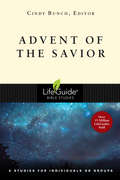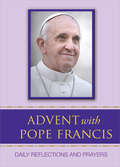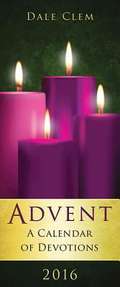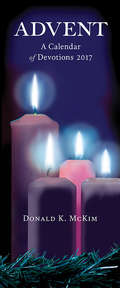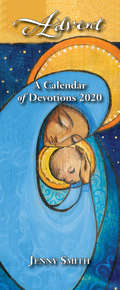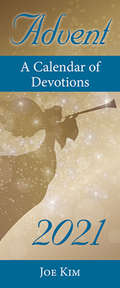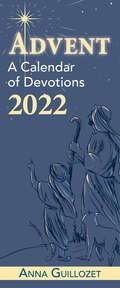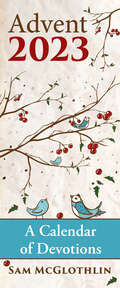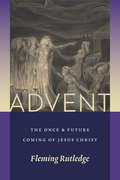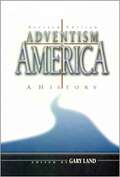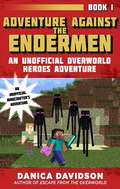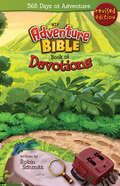- Table View
- List View
Advent for Everyone: A Journey Through Matthew
by N. T. WrightAdvent for Everyone: Mark, Year B provides readers with an inspirational guide through the Advent season, from the first Sunday in Advent through the Saturday after the Fourth Sunday in Advent. Popular biblical scholar and author N. T. Wright provides his own Scripture translation, brief reflection, and a prayer for each day of the season, helping readers understand Advent in the wider context of God's love. Wright's engaging and accessible writing and imagery help us see Advent both in relation to the gospel message and in our own lives today. Each Sunday's text uses the Mark passage from the Revised Common Lectionary, with the rest of the week drawn from other passages in the Gospel and the lectionary. This book is suitable for both individual and group study and reflection.
Advent for Everyone: Luke
by N. T. WrightAdvent for Everyone: Luke provides readers with an inspirational guide through the Advent season, from the first Sunday in Advent through the Saturday after the Fourth Sunday in Advent. Popular biblical scholar and author N. T. Wright provides his own Scripture translation and brief reflection, exploring the Gospel themes of faith, repentance, justice, and celebration. Wright's engaging reflections take you on a journey of spiritual enlightenment, guiding you toward the wonder and joy of Christmas. This book is suitable for both individual and group study and reflection.
Advent for everyone
by Dr N. T. WrightAdvent for Everyone: Matthew provides readers with an inspirational guide through the Advent season, from the First Sunday of Advent through the Saturday after the Fourth Sunday of Advent. Popular biblical scholar and author N. T. Wright provides his own Scripture translation and brief reflection to guide readers through the season toward the wonder and joy of Christmas. This book is suitable for both individual and group study and reflection.
Advent in Narnia: Reflections for the Season
by Heidi Haverkamp"Walking into Advent can be like walking through the wardrobe. " With its enchanting themes of snow and cold, light and darkness, meals and gifts, temptation and sin, forgiveness and hope--and even an appearance by Father Christmas--C. S. Lewis's The Lion, the Witch, and the Wardrobe fits naturally into the Advent season. As the reader seeks a storied king and anticipates the glorious coming of Christmas, these twenty-eight devotions alternate between Scripture and passages from the novel to prompt meditation on Advent themes. Each devotion also includes questions for reflection. The book also provides several resources for churches, including four sessions for small group discussion and ideas for creating a "Narnia Night" for families. Readers will ultimately come to know God better while journeying through Narnia.
Advent in Plain Sight: A Devotion through Ten Objects
by Jill J. DuffieldIn this daily devotional for Advent, Christmas, and Epiphany, Jill J. Duffield draws readers' attention to ten ordinary objects that appear in the biblical narratives of messianic prophesy and incarnation--objects we encounter in our own lives. Through objects such as gates, trees, cloth, light, and water, readers will find new meaning in the biblical account of Jesus' coming. By connecting everyday objects with biblical texts, Advent in Plain Sight prompts readers to see the near kingdom of heaven on earth and ponder what that divine proximity enables and asks them to do and be. Each daily devotional features a Scripture reading, prayer, and reflection, reminding Christians that God still dwells among us, even in the most ordinary places.
Advent with Pope Francis
by Marianne Lorraine Trouvé FSPLet the inspiring words of Pope Francis guide your Advent journey of preparation so that you can fully celebrate the birth of Christ. This daily devotional includes Scripture citations for each day of the season, a selection of the Holy Father's writings, reflection questions, and a prayer. It will be the perfect volume to remind you to slow down and breathe in God's spirit, no matter how busy you find yourself!
Advent: A Calendar of Devotions 2013
by Deborah WestbrookThe season of Advent provides an opportunity for spiritual renewal for followers of Christ. But often what happens is that we get so caught up in the hurry and rush, the hustle and bustle, the frantic pace of the season that we emerge more spiritually exhausted than refreshed, more disillusioned than inspired to face the coming of a new year. We may have tried so hard to enjoy the holiday season, to recapture a sense of wonder and mystery, only to end up asking, "Is that all there is?" The purpose of Advent, A Calendar of Devotions 2013 is to help you focus on the things that truly matter during this busy season, so that you can experience spiritual renewal. Advent, A Calendar of Devotions 2013 is a booklet of daily devotions for the season of Advent (the four weeks before Christmas) that helps you step back from the bustle and stress of the season and prepare your heart and mind to rejoice in God's loving gift, Jesus Christ. Each daily devotion includes a recommended Scripture reading, a Bible verse, an inspiring message, and an uplifting prayer.
Advent: A Calendar of Devotions 2014 (Package of #10)
by James W. MooreAdvent: A Calendar of Devotions 2014 is a booklet of daily devotions for Advent that helps people step back from the bustle and stress of the season and prepare heart and mind to rejoice in God's loving gift, Jesus Christ. Each daily devotion includes a recommended Scripture reading, a Bible verse, an inspiring message, and an uplifting prayers. The season of Advent provides an opportunity for spiritual renewal for followers of Christ. But often what happens is that we get so caught up in the hurry and rush, the hustle and bustle, the frantic pace of the season that we emerge more spiritually exhausted than refreshed. The purpose of Advent: A Calendar of Devotions 2014 is to help the reader focus on the things that truly matter and experience spiritual renewal.
Advent: A Calendar of Devotions 2015 (Package of #10)
by Nell W. MohneyAdvent: A Calendar of Devotions 2015 is a booklet of daily devotions for Advent that helps people step back from the bustle and stress of the season and prepare heart and mind to rejoice in God's loving gift, Jesus Christ. Each daily devotion includes a recommended Scripture reading, a Bible verse, an inspiring message, and an uplifting prayer. When ordering your for a congregation, secure additional copies for nursing home residents, those in prisons, and other groups in need of encouragement but are unable to attend services. Designed to in a #10 envelope, enables churches to include the booklet in your Advent mailings.klet in your Advent mailings.
Advent: A Calendar of Devotions 2016 (Pkg of #10)
by ClemAn annual favorite, this booklet of daily devotions is designed for every family or individual in the congregation to have a copy.Advent: A Calendar of Devotions 2016 contains brief readings for each day in Advent, including a suggested Scripture, a short devotion, and a closing prayer. It offers an opportunity for daily exposure to God's challenge, love, and goodness which is yearning to be born in you. Sold in packs of 10, booklets are designed to fit in a #10 envelope, enabling churches to include the booklets in their Advent mailings, especially for those unable to attend services. An ideal outreach tool! This booklet fits in a standard business envelope, making it easy to mail to visitors or share as a part of your homebound or prison ministry.
Advent: A Calendar of Devotions 2017 (Pkg of #10)
by Donald K. MckimAn annual favorite, this booklet of daily devotions is designed for every family or individual in the congregation to have a copy. Advent: A Calendar of Devotions 2017 contains brief readings for each day in Advent, including a passage of Scripture, a short devotion, and a closing prayer. In honor of the 500th anniversary of the Protestant Reformation, the selections for 2017 reflect the writings of the Protestant reformers. Sold in packages of 10, the booklets are designed to fit in a #10 envelope, enabling churches to include them in their Advent mailings, especially to parishioners unable to attend services, and making it easy to mail to visitors or share as a part of homebound or prison ministry.
Advent: A Calendar of Devotions 2020 (Pkg of 10)
by Jenny SmithProviding daily devotions for Christians as they prepare to celebrate Christ's birth, this annual favorite is a wonderful resource for churches to give to each family to emphasize the importance of the Advent of our Lord. Each day’s reading, from December 1 to Christmas Day, is based on the Revised Common Lectionary and includes the Scripture, a short devotion, and a closing prayer. Larger font for ease of reading. Sold in packs of 10, booklets are designed to fit in a #10 envelope, enabling churches to include them in Advent mailings, and making it easy to mail to visitors or share as a part of home-bound or prison ministry.
Advent: A Calendar of Devotions 2021
by Joe KimA convenient and affordable Advent devotional for the entire church.Advent: A Calendar of Daily Devotions provides daily devotions for Christians as they prepare to celebrate the birth of Christ. This annual favorite is a wonderful resource for churches to give to each family to emphasize the importance of the Advent of our Lord. Each day's reading, from Sunday November 28 to Christmas Day, is based on the Revised Common Lectionary and includes the Scripture, a short devotion, and a brief prayer and it's printed with a larger font for ease of reading.Sold in packs of 10, booklets are designed to fit in a #10 envelope, enabling churches to include them in Advent mailings, and making it easy to share with visitors or others the church wishes to reach during the Advent season.
Advent: A Calendar of Devotions 2022
by Anna Catherine GuillozetA convenient and affordable Advent devotional for the entire church.Advent: A Calendar of Daily Devotions provides daily devotions for Christians as they prepare to celebrate the birth of Christ. This annual favorite is a wonderful resource for churches to give to each family to emphasize the importance of the Advent of our Lord. Each day's reading, from Sunday November 27 to Christmas Day, is based on the Revised Common Lectionary and includes the Scripture, a short devotion, and a brief prayer and it's printed with a larger font for ease of reading.
Advent: A Calendar of Devotions 2023
by Sam McGlothlinA convenient and affordable Advent devotional for the entire church.Advent: A Calendar of Daily Devotions 2023 provides daily devotions for Christians as they prepare to celebrate the birth of Christ. This annual favorite is a wonderful resource for churches to give to each family to emphasize the importance of the Advent of our Lord. Each day's reading, from Sunday, December 3 to Christmas Day, is based on the Revised Common Lectionary and includes the Scripture, a short devotion, and a brief prayer or practice, and it's printed with a larger font for ease of reading.
Advent: A Calendar of Devotions 2024
by Goodwin, CharityA convenient and affordable Advent devotional for the entire church.Advent: A Calendar of Devotions 2024 provides daily devotions to help you prepare to celebrate the birth of Christ. This annual favorite is a wonderful resource for churches to give to each family to help them observe Advent. Each day’s reading, from the first Sunday of Advent to Christmas Day, is based on the Revised Common Lectionary and includes the Scripture, a short devotion, and a brief prayer or practice. The devotional is printed with a larger font for ease of reading.The devotional ccontains daily devotions that begin on the first Sunday of Advent and end on Christmas Day, and each day includes a suggested Scripture, a short devotion, and a brief prayer or daily practice—all based on the Revised Common Lectionary.
Advent: The Once and Future Coming of Jesus Christ
by Fleming RutledgeAdvent, says Fleming Rutledge, is not for the faint of heart. As the midnight of the Christian year, the season of Advent is rife with dark, gritty realities. In this book, with her trademark wit and wisdom, Rutledge explores Advent as a time of rich paradoxes, a season celebrating at once Christ&’s incarnation and his second coming, and she masterfully unfolds the ethical and future-oriented significance of Advent for the church.
Advent: The Once and Future Coming of Jesus Christ
by Fleming RutledgeAdvent, says Fleming Rutledge, is not for the faint of heart. As the midnight of the Christian year, the season of Advent is rife with dark, gritty realities. In this book, with her trademark wit and wisdom, Rutledge explores Advent as a time of rich paradoxes, a season celebrating at once Christ’s incarnation and his second coming, and she masterfully unfolds the ethical and future-oriented significance of Advent for the church.
Adventism in America: A History
by Gary LandWritten by Adventist scholars who felt a need to better establish and understand their denominational identity and the foundation of their theological beliefs, this book offers a comprehensive, nonapologetic history of the denomination. <p><p> Accurate in scholarship, comprehensive in scope, and objective in tone, it synthesizes present knowledge of the history of the Adventist church in America, and lays the basis for further investigation.
Adventure Against the Endermen: An Unofficial Overworld Heroes Adventure, Book One (Unofficial Overworld Heroes Adventure #1)
by Danica DavidsonAfter discovering a portal to Earth and battling the evil Herobrine and his army of vicious mobs, Steve and his friends are known throughout the Overworld as heroes. Stevie’s enjoying the attention—that is, until he tries to show off and instead falls down a mineshaft. At the bottom of the mineshaft, Stevie finds an Ender crystal with mysterious powers. Soon the Overworld is in danger once again, this time from vicious Endermen! Mayor Alexandra summons Stevie, Alex, Maison, Yancy, and Destiny to try and stop the attacks. When the friends investigate, they quickly realize that the Endermen are looking for something. Could it be Stevie’s Ender crystal? Soon the group of friends—now an Overworld task force—are caught up in a battle larger than any they could have imagined. Can they protect the world of Minecraft from Endermen—and the larger threat of the crystal?Fans of Minecraft will race to the end of this first installment in the Unofficial Overworld Heroes Adventure series by Danica Davidson!
Adventure Bible Book of Devotions, NIV
by Robin Schmitt<P>Grab your spyglass and compass and set sail for adventure! <P>Like a map that leads to great treasure, this revised edition of the NIV Adventure Bible Book of Devotions takes kids on a thrilling, enriching quest.<P> This yearlong devotional is filled with exciting fictional stories about kids finding adventure in the real world.<P> Boys and girls will learn more about God and the Bible, and be inspired to live a life of faith—the greatest adventure of all.<P>Companion to the Adventure Bible, the #1 bestselling Bible for kids.
Adventure Bible Guide: Explore the Stories, People, and Places of Every Book in the Bible (Adventure Bible)
by ZondervanExplore the Bible like never before! This companion to the bestselling Adventure Bible gives young readers the key details of every book of the Bible at their fingertips. With kid-friendly overviews of Genesis through Revelation and full-color infographics, maps, and images, children will strengthen their faith and gain a deeper understanding of the most important story ever told.The Adventure Bible Guide takes readers 8–12 on a fun-filled, informative journey toward truly understanding God&’s Word. This immersive reference guide gives clear, crisp insights into the Bible book by book, including:key details and events that are clearly laid out, in words kids can easily understandcolorful infographics that include historical information, significant events and details, and important biblical characterscallouts with fun facts and key takeawaysmaps that help readers understand where each part of the Bible occurredimages of artifacts and important places that help bring the Bible to lifeThis book is made to be used alongside the Bible to help readers better comprehend the context and background of God&’s Word, condensing the most important information in a highly visual, easy-to-understand format, which in turn helps kids connect with the Bible text in new and deeper ways.The Adventure Bible Guide is:perfect for kids 8–12 learning to explore the Bible on their owna great resource for teachers, parents, and homeschoolers to use to engage students in the Bible and biblical historypart of the wider Adventure Bible line, which includes NIV Adventure Bible, Adventure Bible Book of Devotions,?and The Adventure Bible Book of Daring Deeds and Epic Creations
Adventure Bible Read Through the Bible: 8 Bible Stories for Early Readers (Level 2 I Can Read) (Adventure Bible)
by ZondervanPractice important reading skills while reading eight favorite Bible stories in the Adventure Bible Read Through the Bible. Combining the beloved Adventure Bible with the proven I Can Read format, this Level 2 I Can Read collection combines engaging stories, longer sentences, and beautiful illustrations, perfect for building confidence and developing reading skills. Adventure Bible Read Through the Bible:Is ideal for readers ages 4 and up who are reading with helpTeaches Bible stories in an accessible format while growing critical reading skillsIs perfect for back to school, summer reading, homeschool, and Sunday school classroomsComes in hardcover format for longer lasting durability and is value-priced at $16.99Is part of the Adventure Bible brand, recommended by more schools and churches than any other Bible for kids, and has impacted more than 10 million families to date. Adventure Bible Read Through the Bible features 8 beloved Bible stories:God&’s Great CreationNoah&’s VoyageMoses Leads the PeopleJoseph the DreamerRuth and NaomiBrave Queen EstherMiracles of JesusPaul Meets Jesus
Adventure Bible Storybook: An Interactive Adventure Through God's Redemptive Story (Adventure Bible)
by Catherine DevriesThe newest edition to the top-selling Adventure series, this storybook Bible for kids ages 4-7 will start them on a journey of discovering about the Bible and growing with God as they grow up with the Adventure Bible, at every age and stage, beginning with the Bible Storybook and continuing on through age 12 with the NIV edition. At every twist and turn, the Adventure Bible Storybook is filled with—what else—ADVENTURE! Parents and loved ones can be assured that children who read it will learn the main stories and themes from the Bible, but all within a fun, exciting theme of discovering, imagination, and suspense—everything you’d expect from a fantastic adventure. This storybook includes some lesser known stories that are particularly adventurous, such as Paul’s shipwreck on the island of Malta, and when the Israelites went to spy on the people of Canaan. The Adventure Bible Storybook was the 2009 Retailers Choice Award winner in the Children’s Nonfiction category.
